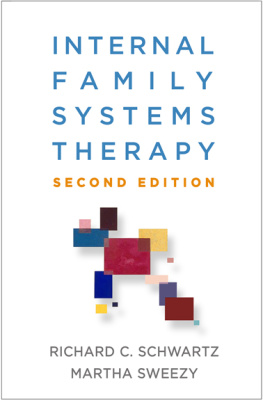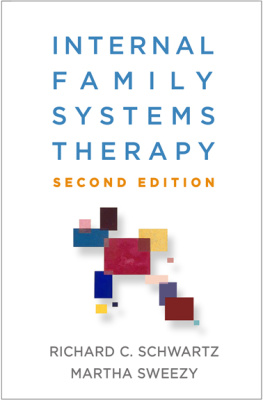Negotiating for Self-Leadership
in Internal Family Systems Therapy

Jay Earley, PhD
Negotiating for Self-Leadership in Internal Family Systems Therapy
Copyright 2012 by Jay Earley. All right reserved.
All rights reserved. No part of this publication may be reproduced, stored in a retrieval system, or transmitted, in any form or by any means, electronic, mechanical, photocopying, recording, or otherwise, without the written prior permission of the author.
FIRST EDITION eBOOK
Paperback ISBN-13: 978-0-9855937-1-1

140 Marina Vista Ave.
Larkspur, CA 94939
415-924-5256
www.patternsystembooks.com
Introduction to the
IFS Professional Booklet Series
This is a series of booklets that cover advanced topics in IFS theory and practice. Some of the booklets describe concepts that are well known in the professional IFS community but that havent been put into written form before. Other booklets introduce original ideas about how to practice IFS more effectively or understand its theory in a fuller way.
In my opinion, IFS is by far the most effective and respectful psychotherapy model. At this point, it is taught mostly through an excellent professional training program rather than through writings. Therefore, the professional literature on IFS hasnt yet done justice to the profound nature of the approach. This series, along with my other IFS books, attempts to remedy this situation.
With the advent of ebooks, there is no longer a need to dispense information in the standard book length. It is now very easy to make a piece of writing any length that is appropriate. Each of these booklets will be shorter than book length yet long enough to provide you with substantial information on one specific IFS issue.
Acknowledgments
I am very grateful to Richard Schwartz, PhD, for creating the profound IFS Model, which has completely transformed not only the way I do therapy but also my teaching and writing. Susan McConnell provided wise feedback that helped me to improve this booklet.
Jeannene Langford continued her excellent work with my book covers, and Kira Freed continued her fine work of editing and proofreading.
Table of Contents
Introduction
This booklet is intended primarily for Internal Family Systems Therapy (IFS) therapists and practitioners. It assumes knowledge of the IFS view of the psyche and the IFS method. It should also be useful to therapists not trained in IFS or who are new to the IFS Model, so I have included a glossary in which the basic IFS concepts are defined.
Imagine a situation in which a client of yours has a difficult situation coming up in the next week that she asks for help with. She usually acts in a self-destructive manner in this situation, and she wants to change that. You begin to work with the protector that causes her self-destructive behavior. Once she has connected with this protector, you would ideally like to unburden the exile it is protecting so you can help this protector to relax and allow the client to interact more safely. However, she is a new client with a fair amount of trauma, so you havent even begun to gain access to her exiles yet, and you certainly arent going to get there today. What do you do to help her with this situation this week?
This booklet introduces a method that I call negotiating for Self-leadership, which could benefit such a client now without waiting until you can help her exiles heal.
Internal Family Systems Therapy (IFS) is a cutting-edge psychotherapy approach that has been spreading rapidly around the country and the world over the last decade. It is the signature work of pioneering psychologist Richard Schwartz. IFS is extremely powerful for accessing deep psychological wounds and healing them. It is especially effective with trauma, and there has been increasing interest in IFS among trauma specialists. IFS is also quite effective at helping clients with everyday life issues as well as with spiritual development.
Schwartz, originally a family systems therapist, started working with his clients inner worlds and discovered their subpersonalities, which he calls parts. He realized that his clients parts were related to each other in systems that were similar to those he recognized in families, hence the name Internal Family Systems Therapy. IFS is user friendly. It is easy for clients to understand its concepts and natural for most of them to access and relate to their parts.
In following the normal IFS procedure, once you have gotten to know a protector and developed a trusting relationship with it, you ask permission to work with the exile or exiles it is protecting. The principle is that most protectors cant fully let go of their roles until the exiles they are protecting have been unburdened. Once you have permission, you go through a series of healing steps with the exile, and then you return to the protector to see if it now can let go of its protective role.
However, there are situations in which it may take quite a bit of time to heal the exiles, especially when there is trauma. It could take months to get through all the protectors and fully heal a traumatized exile. And if more than one exile is being protected, it may take even longer. If clients have important situations that involve a protector coming up in their lives in the next week or two, it can be very helpful to find a way to get that protector to relax before all its exiles have been healed. This calls for negotiating for Self-leadership.
There is also another situation in which negotiating for Self-leadership can be helpful. Lets say that as a result of unburdening the exiles behind a protector, it has relaxed to some extent, but it hasnt let go completely. By negotiating for Self-leadership, you can convince it to relax even more or even completely let go.
This booklet describes how to help a client to negotiate with a protector to allow the client (in Self) to handle a certain imminent life situation rather than having the protector blend with the client (as usual) and handle the situation in its extreme or dysfunctional way.
The method described in this book has been taught by Richard Schwartz in his trainings but has not been put into writing before this booklet. It includes the IFS process of updating, in which the client helps a protector to see that the client is a competent adult, not a vulnerable child. Updating is explained in .
Usually, the client will be negotiating with the protector about a situation in which the protectors fears are unrealistic because they come from childhood. explains how to handle this.
discusses when it is appropriate to use negotiating for Self-leadership. All three chapters contain detailed transcripts of sessions illustrating the process.
This is a technique that some IFS therapists naturally employ when needed. This book should enhance your skill in using this technique successfully in your work with clients.
Chapter 1
Updating
Updating is a standard IFS technique. Our clients protectors are stuck in the past; they believe that our clients are little children who are vulnerable and have few internal or external resources for handling problematic situations. This is, in fact, how we all were as children. Another way to say this is that the protector is protecting a young, vulnerable exile, and it thinks that the client is the exile. It doesnt realize that the client has a Self with many more resources than when he or she was a child.
Next page












